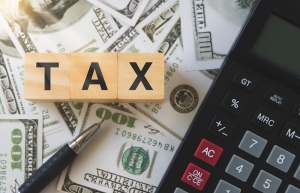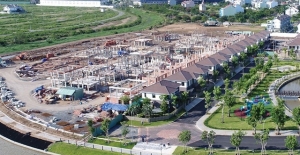Wheels in motion to resolve impediments in real estate
The government on December 14 issued Official Letter No.1164/CD-TTg, outlining the responsibility of ministries and branches to eliminate obstacles associated with corporate real estate bonds.
The previous month, it also issued Decision No.1435/QD-TTg, which established a working group to resolve bottlenecks in the execution of local real estate projects.
BHS Group is planning such a project, with huge housing developments in Danang and Cam Ranh; these properties are to be priced between $29,000 and $42,000. Chairman of BHS Group Nguyen Tho Tuyen said, “We want to distribute the items at the optimal period, when the market bottoms out at the end of 2023.”
 |
| Vietnam wants to kickstart real estate prospects as soon as possible, photo Le Toan |
However, Tho is concerned that if interest rates do not change or continue an upward trend in early 2023, it would be disastrous because it would “impact the mentality of investors”.
Some groups have recently implemented a sales strategy that offers homeowners zero interest for the first two years. According to this strategy, the grace period will expire in 2023, at which point investors would be required to pay principle and interest on their own loans using variable market interest rates.
Given that the real estate market is on the verge of entering a recession, the concerns of Tho from BHS Group may be well-founded. According to a number of real estate companies, legal and mechanism issues are critical when undertaking social housing projects. In addition, the state offers incentives to lower the cost and complexity of purchasing a home.
Le Huu Nghia, general director of Le Thanh Construction Trading Co., Ltd., said, “At present, the application process for social housing is complicated by several rules.” According to Nghia, the investment and housing law processes are conflicting, making the situation tough for both companies and homeowners.
“One particular issue is faced by self-employed homebuyers. There are checks on whether or not a person owns a home, but they do not verify if an individual who wants to purchase a home pays personal income tax. This prevents firms from submitting papers to the Department of Construction for evaluation,” Nghia said.
According to the Ho Chi Minh City Real Estate Association (HoREA), legal issues account for the majority of the challenges facing real estate projects. A variety of conflicting and inconsistent legal provisions are the primary cause.
HoREA chairman Le Hoang Chau said that administrative processes are complex and inconsistent, forcing firms to spend a long time to complete them “or lose commercial prospects” as a result of rising investment costs. He cited over 100 real estate projects in Ho Chi Minh City with unresolved legal issues dating back almost a decade, such as the social housing project Le Thanh Tan Kien, phase 2, which has been unable to proceed with development because planning has not been revised.
Amendments to the 2013 Law on Land are hoped to be completed soon, along with a number of associated regulations to provide uniformity and consistency. This procedure is anticipated to be finished in 2023, thus Chau said there should be more immediate remedies, such as addressing present legal issues and aiding the recovery of the real estate market.
HoREA has advised the government to quickly develop a standard protocol for investment processes for urban and commercial housing projects. It also suggested that, for social housing projects, municipalities expeditiously adopt processes for approving policies and investors in the event that firms acquire land transfers and are not obliged to adhere fully to the plan.
Dr. Vo Tri Thanh, director of the Institute for Brand and Competitiveness Strategy, remarked that the dedication of the government and the National Assembly to create momentum with the economic stimulus and remove policy inefficiencies is a strong indicator that will help the economy and the real estate market recover and flourish.
“The main remedy is to modify the land law. However, it is also vital to evaluate the approach: whether specific or generic, it must be grounded in reality. Additionally, it must be addressed as to how to manage it; only then can the existing difficulties and arguments be resolved,” Thanh said.
He added that removing some policy obstacles would assist real estate companies to be more confident with their business plans in 2023, particularly after three years of being afflicted by the geopolitical situation, consequently causing a domino effect in numerous other economic sectors.
 | Tax proposal for second properties presents questions over viability A new second property tax pilot proposal has raised concerns that the market will become affected by low liquidity, discouraging buyers. |
 | Ho Chi Minh City suburban real estate market set for revival After a lengthy period of inactivity, the real estate market in and around Ho Chi Minh City is resuming deals, mostly in new full-scale developments. |
 | Liquidity risk topping realty concerns Vietnam will have to tackle a raft of liquidity issues facing realtors before the country’s stock market can rebound, an economic forum heard earlier this month. |
What the stars mean:
★ Poor ★ ★ Promising ★★★ Good ★★★★ Very good ★★★★★ Exceptional
Related Contents
Latest News
More News
- Construction firms poised for growth on public investment and capital market support (February 11, 2026 | 11:38)
- Mitsubishi acquires Thuan An 1 residential development from PDR (February 09, 2026 | 08:00)
- Frasers Property and GELEX Infrastructure propose new joint venture (February 07, 2026 | 15:00)
- Sun Group led consortium selected as investor for new urban area (February 06, 2026 | 15:20)
- Vietnam breaks into Top 10 countries and regions for LEED outside the US (February 05, 2026 | 17:56)
- Fairmont opens first Vietnam property in Hanoi (February 04, 2026 | 16:09)
- Real estate investment trusts pivotal for long-term success (February 02, 2026 | 11:09)
- Dong Nai experiences shifting expectations and new industrial cycle (January 28, 2026 | 09:00)
- An Phat 5 Industrial Park targets ESG-driven investors in Hai Phong (January 26, 2026 | 08:30)
- Decree opens incentives for green urban development (January 24, 2026 | 11:18)

 Tag:
Tag:




















 Mobile Version
Mobile Version